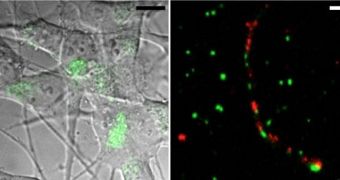A group of investigators with the University of Cambridge recently published the conclusions of a new study that show how very small amounts of a single protein can trigger the development of a particular type of dementia in the human brain.
The research, which is detailed in the latest issue of the Journal of Biological Chemistry, suggests that minimal amounts of the tau protein can kick-start an aggregation process in the brain that ultimately leads to the formation of neural plaques – a sign of the neurodegenerative disease called Alzheimer's .
In addition to revealing the role of the tau protein in the early stages of the condition, the research also highlights a potential connection between traumatic brain injuries and the development of dementia. Such a link was previously hypothesized, but never established in science.
The research group used a powerful laser imaging technique to look at model cell cultures emulating the human brain. Minute amounts of tau introduced into the culture medium triggered effects similar to the development of neuronal plaques in dementias.
The group argues that these results should not be taken at face value. Though the correlation between this protein and Alzheimer's is very clear in cell culture studies, the roots of this disorder are probably significantly more complex in the working human brain. Other proteins, such as beta-amyloid, are known to play a role, too.
“These are molecular-level glimpses of what may be going on. We are just beginning to see the molecular steps that may provide an explanation for what we see in the brains of patients who have died of Alzheimer’s,” says Cambridge chemical physics professor Clemens Kaminski.
The expert, who was also the leader of the new study, says that the tau protein is found inside healthy brain cells at all times. However, for some reason, these molecules tend to start clumping up in the brains of patients who develop dementias, including Alzheimer's.
“The study underlines how significant the uptake of small quantities of tau might be as an initiator for the conditions that then prevail in the brains of Alzheimer’s sufferers,” the team leader explains.
“It is one piece in the puzzle that could provide us with an explanation as to why head injuries may be connected to the disease. It’s not necessarily correct – but it is plausible,” he concludes.

 14 DAY TRIAL //
14 DAY TRIAL //